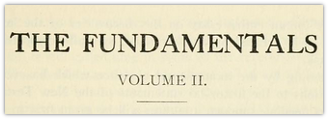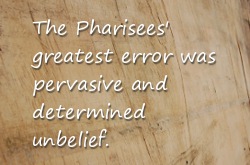The Testimony of the Monuments to the Truth of the Scriptures
[node:22019 collapsed body]

CHAPTER I. THE TESTIMONY OF THE MONUMENTS TO THE TRUTH OF THE SCRIPTURES.
BY PROF. GEORGE FREDERICK WRIGHT, D. D., LL. D., OBERLIN COLLEGE.
Discussion
Where is the Ark of the Covenant? (Part 2)
Read part 1. 
Fact Three
A Jewish tradition exists that the Ark had been buried under the “Chamber of Wood” in the Temple prior to the Babylonian destruction in 586 BC. We should note, however, that this tradition appeared hundreds of years later than the destruction of the Temple. Furthermore, the rabbi that mentioned this tradition was opposed by other rabbis in the Talmudic discussion on this subject in Yoma 53b. The fact that this discussion took place in approximately 160 A.D. and that such an act of burying was not recorded either in the Bible or in previous apocryphal books makes this tradition questionable. This does not prevent, however, some orthodox rabbis in Jerusalem today from believing that the Ark is still underneath the Temple Mount and will be recovered someday by archaeologists or Jewish religious leaders. It is often overlooked, however, that the subterranean sections of the Temple Mount have been dug up or explored a number of times since 586 B.C. People like Herod the Great (37-4 B.C.), the Moslem conquerors (640 A.D. ff.), the Crusaders (1199 AD ff.), the Turks (1540 AD ff.), and the British explorer Charles Warren (1850-70) dug up or explored all the subterranean regions of the Temple Mount and no one claimed to have found the ark. It is often forgotten that Warren was a dedicated Free Mason who was actually searching for the ark! Rabbinic “reports” about a so-called ark-sighting after the ‘67 War are purely apocryphal and have no independent confirmation or photographs. While the remote possibility still exists that it is in a hidden chamber under the mount, only time will tell and skepticism about its presence there is highly advisable.
Discussion
Where is the Ark of the Covenant? (Part 1)
 (Dr. Varner’s posts regarding the ark of the covenant are part of an ongoing series exploring Isreal’s beliefs about the Messiah, beginning in OT times. You can follow that series at DrIBEX Ideas.)
(Dr. Varner’s posts regarding the ark of the covenant are part of an ongoing series exploring Isreal’s beliefs about the Messiah, beginning in OT times. You can follow that series at DrIBEX Ideas.)
Has the ark of the covenant been Discovered?
The end of the Old Testament period brought a different world to the Jewish people than what they had been used to experiencing. Not the least of these changes involved the loss of their independence and the destruction of their Temple. As we begin our consideration of the Messianic promise during the time between the testaments, it is good to pause and attempt to answer a question that I am often asked—the whereabouts of the Ark of the Covenant. The problem is that the Bible is silent about what happened to it before or after the destruction of the Temple in 586 B.C. While the issue is not directly related to the subject of the Messiah, it will serve to introduce the next period that will concern us—the Intertestamental age and how the Messianic idea underwent change and even caused some of that change!
The Ark of the Covenant was the central furnishing both in the Tabernacle and also later in the Temple of Solomon. It was a chest made of acacia wood covered by gold, 3 3/4 feet in length and 2 1/4 feet wide and high. Within were the two tables of the Law. It was from above this Ark, between the cherubim attached to the mercy seat resting upon the Ark, that Yahweh communed with Israel (cf. Ex. 25:22).
Discussion
Doctrinal Error in Thayer's Lexicon
[amazon 0913573221 thumbnail]
Reprinted with permission from As I See It. AISI is sent free to all who request it by writing to the editor at [email protected].
Question
Brother Kutilek,
In your most recent edition of AISI, you recommend Thayer’s “A Greek-English Lexicon of the New Testament.” I have used this lexicon extensively since the day my former pastor helped me pick out my copy at a local used book store. At that time, my pastor told me to watch out for Thayer’s doctrine with regard to the Trinity or deity of Christ, or perhaps his potential unitarianism. My pastor said he hadn’t found it, but he had been made aware of the warning and was just passing it on to me. I haven’t found it either. For a while, I have been using the Thayer’s edition that is online at Blue Letter Bible. I found the same warning there. They post this disclaimer online:
Caution: According to Baker’s modern copyright edition, Thayer was apparently not doctrinally sound in all areas, particularly in the area of the trinity, and so the user must be on guard. We would be appreciative of any actual examples of doctrinal error, so they can be marked with “caution” tags.
Brother K., you seem to be a person who is typically aware of this kind of information, so I thought I would ask you if you can shed any light on this. Do you know of any specific unsoundness in Thayer’s lexicon? Do you know of any particular entries where the user might be cautioned? Do you have any biographical information on Thayer (or perhaps on Grimm) that would uphold or refute this warning?
Thank you…
Discussion
Prof. calls for resignation of Exodus International leader
Body
Robert A. J. Gagnon questions the doctrine of the perseverance of the saints and argues that Alan Chambers should step down from EI for saying gays can go to heaven.
Evangelical Calls on Alan Chambers to Step Down Over ‘Gays Can Go to Heaven’ Remarks
Discussion
Rules of Affinity, Part 5: Clarifying the Purpose
 Posted courtesy of Dr Reluctant. Catch up on the series so far.
Posted courtesy of Dr Reluctant. Catch up on the series so far.
In my so-called “Rules of Affinity” I am seeking to accomplish one main task. That task is to uncover the degree of affinity between any statement of a doctrine or part doctrine, and the biblical references which are brought in to support it or defend it. All of us know that Christians with different theological outlooks claim that their views are biblical. But in reality just saying “I believe such-and-such because it’s biblical” does not mean that it actually is biblical. It may be. But, for example, if someone says, “Calvinism is biblical” and someone else says “Arminianism is biblical” it stands to reason that behind both statements is the opinion (either informed or uninformed) of the one making the claim. No one ought to assume that any statement is proven by assertion.
As I was reading my own theology and thinking through the question of why I differed from this or that theologian, I concluded, naturally enough, that the main reason for my disagreements was because I believed my position was more in line with the Bible. That didn’t mean it was, but that was why I demurred. The words “God has spoken” seem to me to be the most momentous three words in the English language. I therefore wanted to know if what I believed and taught actually closely reflected what “God has spoken,” and how compatible were my theological propositions with the texts I appealed to. I did this by assuming a suspicious attitude towards my Theology. Hence, the negative application of the method was uppermost in my mind when it was first roughly devised. The negative use also became apparent when I began asking myself why I couldn’t accept certain formulations of doctrine by some of the great men I read. Almost immediately it dawned on me that the chiefest doctrines of the Christian Faith: the doctrines all Christians would say must be believed at a minimum to be a Christian, involved very straightforward appeals to biblical passages (hence, the Positive Application of the rules).
Discussion
In Defense of Rules, Part 2
 Read Part 1
Read Part 1
“Rules were meant to be broken,” an old adage goes. Christians tend to have a different attitude, but we recognize a kernel of truth in the folk wisdom. Rules are so often wrong-headed, excessive, or motivated by foolish fears or lust for power. Sometimes they get in the way of the very things they are intended to accomplish.
Christian ministries can have too many rules and develop a cold, offense-focused culture. They can also err by according some rules a spiritual significance and power they don’t possess. These problems require that we give serious thought to what rules we have and what they are really accomplishing. But we should not overreact to the excesses and errors, criticize rules systems too broadly and blame them for problems that have other causes.
In Part 1 of this series, I presented two arguments for valuing rules more than many fundamentalists and evangelicals are inclined to nowadays. Here, I’ll offer a third argument, then respond to some objections.

Discussion